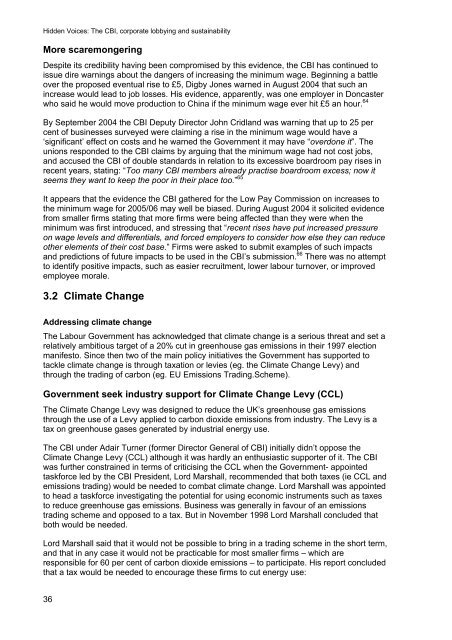hidden_voices
hidden_voices
hidden_voices
Create successful ePaper yourself
Turn your PDF publications into a flip-book with our unique Google optimized e-Paper software.
Hidden Voices: The CBI, corporate lobbying and sustainabilityMore scaremongeringDespite its credibility having been compromised by this evidence, the CBI has continued toissue dire warnings about the dangers of increasing the minimum wage. Beginning a battleover the proposed eventual rise to £5, Digby Jones warned in August 2004 that such anincrease would lead to job losses. His evidence, apparently, was one employer in Doncasterwho said he would move production to China if the minimum wage ever hit £5 an hour. 64By September 2004 the CBI Deputy Director John Cridland was warning that up to 25 percent of businesses surveyed were claiming a rise in the minimum wage would have a‘significant’ effect on costs and he warned the Government it may have “overdone it”. Theunions responded to the CBI claims by arguing that the minimum wage had not cost jobs,and accused the CBI of double standards in relation to its excessive boardroom pay rises inrecent years, stating: “Too many CBI members already practise boardroom excess; now itseems they want to keep the poor in their place too.” 65It appears that the evidence the CBI gathered for the Low Pay Commission on increases tothe minimum wage for 2005/06 may well be biased. During August 2004 it solicited evidencefrom smaller firms stating that more firms were being affected than they were when theminimum was first introduced, and stressing that “recent rises have put increased pressureon wage levels and differentials, and forced employers to consider how else they can reduceother elements of their cost base.” Firms were asked to submit examples of such impactsand predictions of future impacts to be used in the CBI’s submission. 66 There was no attemptto identify positive impacts, such as easier recruitment, lower labour turnover, or improvedemployee morale.3.2 Climate ChangeAddressing climate changeThe Labour Government has acknowledged that climate change is a serious threat and set arelatively ambitious target of a 20% cut in greenhouse gas emissions in their 1997 electionmanifesto. Since then two of the main policy initiatives the Government has supported totackle climate change is through taxation or levies (eg. the Climate Change Levy) andthrough the trading of carbon (eg. EU Emissions Trading.Scheme).Government seek industry support for Climate Change Levy (CCL)The Climate Change Levy was designed to reduce the UK’s greenhouse gas emissionsthrough the use of a Levy applied to carbon dioxide emissions from industry. The Levy is atax on greenhouse gases generated by industrial energy use.The CBI under Adair Turner (former Director General of CBI) initially didn’t oppose theClimate Change Levy (CCL) although it was hardly an enthusiastic supporter of it. The CBIwas further constrained in terms of criticising the CCL when the Government- appointedtaskforce led by the CBI President, Lord Marshall, recommended that both taxes (ie CCL andemissions trading) would be needed to combat climate change. Lord Marshall was appointedto head a taskforce investigating the potential for using economic instruments such as taxesto reduce greenhouse gas emissions. Business was generally in favour of an emissionstrading scheme and opposed to a tax. But in November 1998 Lord Marshall concluded thatboth would be needed.Lord Marshall said that it would not be possible to bring in a trading scheme in the short term,and that in any case it would not be practicable for most smaller firms – which areresponsible for 60 per cent of carbon dioxide emissions – to participate. His report concludedthat a tax would be needed to encourage these firms to cut energy use:36


